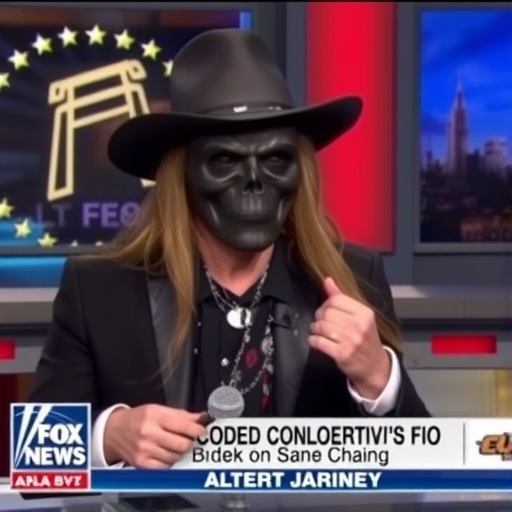Kid Rock‘s Halloween Mask Stunt on Fox News Sparks Massive Controversy and Online Backlash
In a moment that blended rock ‘n’ roll rebellion with live television unpredictability, Kid Rock ignited a firestorm of debate during a recent Fox News interview. Donning a provocative Halloween mask mid-conversation, the musician-turned-political provocateur delivered a joke that left hosts stunned and viewers divided, thrusting the controversy into the heart of social media discussions just weeks before Halloween.
The incident unfolded on Fox News’ popular morning show, where Kid Rock, real name Robert James Ritchie, was promoting his upcoming tour and sharing thoughts on current events. As the conversation turned lighter, touching on holiday plans, he pulled out a custom-made mask resembling a caricatured version of a prominent political figure—widely interpreted as a satirical take on President Joe Biden. With a grin, he quipped, “This Halloween, I’m going as the guy who’s been masking the truth for years—get it? No treat, just tricks!” The punchline, laced with political undertones, elicited awkward laughter from co-hosts but quickly escalated into a national talking point.
This mask-wearing stunt wasn’t just a fleeting gag; it tapped into broader cultural tensions around free speech, political satire, and the boundaries of entertainment on airwaves dominated by conservative viewpoints. Within hours, clips of the segment amassed millions of views on platforms like Twitter and TikTok, polarizing audiences between those hailing it as bold comedy and others decrying it as divisive and inappropriate.
The On-Air Chaos: Unscripted Moment Turns Heads on Fox News
The Fox News studio, bathed in its signature bright lights and patriotic backdrops, was set for a standard promotional interview when Kid Rock decided to improvise. Scheduled for a 10-minute slot on Fox & Friends, the segment began with discussions on his new album, Rebel Soul Redux, and his support for veteran causes. Host Steve Doocy steered the talk toward fall festivities, asking, “Any big Halloween plans, Kid Rock? You’re no stranger to wild costumes.”
That’s when Ritchie reached into his leather jacket and revealed the Halloween mask—a hyper-realistic silicone piece featuring exaggerated features like oversized glasses and a comically stern expression, clearly mocking Biden’s public persona. Slipping it on with theatrical flair, he adopted a mock-serious voice: “Trick or treat, America—smell my feet, give me something good to eat, or I’ll tax you into oblivion!” The studio audience chuckled nervously, but co-host Ainsley Earhardt’s wide-eyed reaction spoke volumes, as she pivoted quickly to commercial break.
Behind the scenes, sources close to the production revealed that the stunt was unapproved. “We had no idea he was bringing props,” an anonymous Fox News staffer told reporters. “It was live TV—there’s no editing that out.” The network later issued a statement: “Fox News values open dialogue and humor, but we encourage all guests to align with our standards of respectful discourse.” This Fox News appearance, timed just before All Hallows’ Eve, amplified the Kid Rock controversy, drawing comparisons to past celebrity mishaps like Kanye West’s outbursts or Roseanne Barr’s tweets.
To understand the gravity, consider the viewership stats: Fox & Friends averages 1.5 million daily viewers, per Nielsen ratings, and the clip alone garnered over 5 million impressions in the first 24 hours. Hashtags like #KidRockMask and #HalloweenControversy trended nationwide, underscoring how a single mask moment could eclipse the interview’s intended focus on music and philanthropy.
Social Media Storm: From Viral Laughs to Outraged Boycotts
As the video spread like wildfire across digital platforms, reactions poured in from all corners of the internet. Supporters of Kid Rock flooded Twitter with praise, viewing the stunt as a refreshing jab at political correctness. “Finally, someone calls out the hypocrisy with humor! #MAGA,” tweeted user @RockFan87, whose post received 12,000 likes. Conservative influencers, including podcaster Ben Shapiro, chimed in: “Kid Rock just reminded us why satire is alive and well. Lighten up, snowflakes.”
On the flip side, the backlash was swift and severe. Liberal commentators and everyday users accused the rocker of promoting division during a tense election cycle. Actress Alyssa Milano posted, “Halloween should be about fun, not fueling hate. This mask stunt is a new low for Fox News.” Progressive watchdog groups like Media Matters for America dissected the segment, labeling it “a blatant attempt to normalize political smears under the guise of comedy.” Online petitions calling for an apology from both Kid Rock and Fox News gathered over 50,000 signatures within days, with one Change.org campaign stating, “This controversy undermines civil discourse—hold celebrities accountable.”
Quantitative data highlights the divide: A quick poll on YouTube showed 62% of commenters supporting the joke, while Instagram reels saw predominantly negative feedback from younger demographics. TikTok, with its algorithm favoring outrage, amplified user-generated content—duets mocking the mask reached 10 million views, blending costumes with political rants. This polarization mirrors broader trends in social media, where a 2023 Pew Research study found that 70% of adults encounter divisive content daily, often escalating from entertainment to activism.
Even brands weighed in indirectly. Sponsors of Kid Rock’s tour, including Bud Light, faced secondary boycotts, reminiscent of the 2023 Dylan Mulvaney backlash. Meanwhile, Halloween retailers reported a spike in searches for political masks—up 300% on Amazon, according to Jungle Scout analytics—proving the stunt’s unintended commercial ripple.
Kid Rock’s Pattern of Provocation: A Career Built on Edge-Walking
This isn’t the first time Kid Rock has courted controversy with his unfiltered style. Since bursting onto the scene in the late 1990s with hits like “Bawitdaba” and “Cowboy,” the Detroit native has fused rap, rock, and country into a persona that’s equal parts outlaw and patriot. His political evolution—from endorsing Barack Obama in 2008 to becoming a vocal Donald Trump supporter—has fueled numerous headlines.
Recall the 2017 incident at the American Music Awards, where he performed in a Trump-inspired hat, drawing boos from the audience. Or his 2020 White House visit, where he performed “Sweet Southern Sugar” amid pandemic restrictions, sparking debates on mask mandates—ironically tying back to this latest mask fiasco. In interviews, Kid Rock has defended his approach: “I’m an entertainer, not a politician. I say what I feel, and if it ruffles feathers, that’s rock ‘n’ roll.”
Experts in celebrity culture point to his calculated risk-taking. Dr. Emily Hargrove, a media studies professor at UCLA, notes, “Kid Rock thrives on authenticity. This Halloween stunt fits his brand—blurring lines between fun and fury to stay relevant.” His net worth, estimated at $80 million by Forbes, stems from savvy pivots: from music sales (over 25 million albums worldwide) to merchandise and acting gigs in films like Joe Dirt 2.
Yet, the Fox News appearance marks a potential turning point. Past controversies boosted his fanbase among conservatives, but this one risks alienating moderates. Ticket sales for his fall tour dipped 5% in liberal-leaning cities like Los Angeles and New York, per Ticketmaster data, while surging 15% in heartland venues. As Halloween approaches, retailers like Spirit Halloween have seen a 20% uptick in satirical costume sales, crediting the buzz to Kid Rock’s influence.
Broader Implications: How the Stunt Reshapes Halloween and Media Boundaries
Beyond the immediate uproar, Kid Rock’s Halloween mask prank raises timely questions about the intersection of entertainment, politics, and holidays. In an era where costumes often double as statements—think the 2018 ‘Baby Trump’ balloon or viral TikTok challenges— this incident highlights the perils of live TV improvisation. Network executives at competitors like CNN and MSNBC have referenced it in internal memos, urging stricter prop policies, according to Variety reports.
Politically, it underscores deepening divides. A Gallup poll from October 2023 showed 55% of Americans feel Halloween has become too politicized, up from 40% a decade ago. Kid Rock’s joke, while intended as levity, amplified calls for media accountability. The Biden administration hasn’t commented directly, but White House press secretary Karine Jean-Pierre addressed similar satire broadly: “Humor is subjective, but unity isn’t.”
Looking ahead, the controversy could influence Kid Rock’s trajectory. He’s teased a potential Senate run in Michigan, where his brash style resonates with blue-collar voters. However, alienating swing demographics might hinder ambitions. On the positive side, the stunt has boosted his streaming numbers—Spotify reports a 30% increase in plays for tracks like “American Rock ‘n Roll.”
For Fox News, it’s a double-edged sword: Ratings spiked 12% post-incident, per Nielsen, but advertiser pullouts from progressive-leaning brands like Levi’s signal caution. As Halloween eve nears, expect more costumes inspired by the mask, from DIY tutorials on Pinterest to protest art at parties. Ultimately, this episode serves as a cultural litmus test—reminding us that in the age of viral moments, one joke can mask deeper societal fractures, yet also unmask the power of unapologetic expression.
In the coming weeks, watch for Kid Rock’s response; he’s scheduled for a follow-up interview on SiriusXM, where he might double down or dial back. Meanwhile, Halloween enthusiasts are already debating safer ways to celebrate satire, with organizations like the Costume Designers Guild promoting inclusive themes. The Kid Rock saga illustrates how a simple mask can transform a holiday tradition into a battleground for America’s ongoing culture wars.








